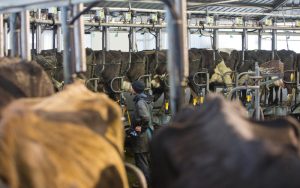
Fonterra chief executive Miles Hurrell says the dairy giant is “open-minded” about New Zealand reviewing its rules around genetic modification.
The National Party wants to reverse a ban on gene editing (GE) and genetically modified organisms (GMO), saying it is costing the country and making it harder to reach climate change goals. The Labour Party says any change could hurt primary goods exporters who have benefited from their GMO-free status.
Fonterra, the country’s largest dairy company, markets its products as non-GMO, and is getting value from that, Hurrell said in an interview at Fieldays on Wednesday.
“The question needs to be what is the value upside that we can see out of that long term, versus what value may be created by introducing some of these technologies,” Hurrell said.
“What is the upside of doing one versus the other? That’s a conversation and a review I think that needs to happen, and let us make the decisions thereafter.”
Hurrell said some technologies could help with climate change such as drought-resistant crops.
“Let’s understand that. Let’s have a review to see what technologies can exist and then make a decision,” he said.
“We’re very much open-minded to understanding what the next phase is.”
Current regulation of gene editing and genetically modified organisms make it very difficult for farms to produce anything from crops, livestock or grasses that have been gene edited. This effective ban has been in place for more than two decades, and was the subject of heated debate when the legislation was last revisited in 2003.
By restricting the growth of gene edited crops, New Zealand can market itself as “GMO free” even though some local researchers do work on gene editing projects.
Hurrell said Fonterra’s views had changed over the past five years, since he first took over as chief executive.
“The world has moved on, quite significantly in the gene editing space in particular. So let’s understand does it have opportunities for us as an industry and how does that play off against some of those market value upsides that you may get,” he said.
























